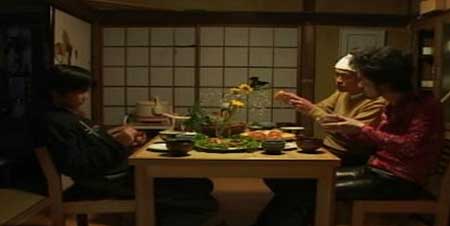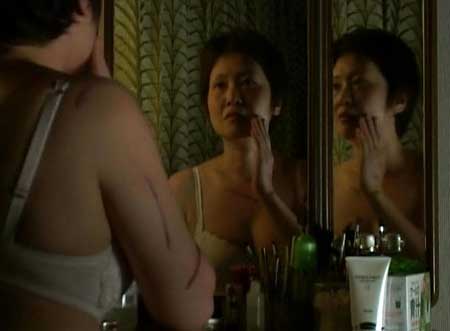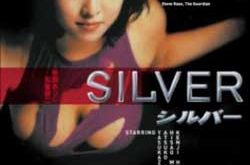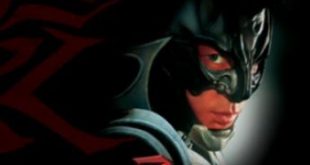SYNOPSIS:
A troubled and perverted family find their lives intruded by a mysterious stranger who seems to help find a balance in their disturbing natures.
REVIEW:
“The sea’s so endless. You can’t see anything.”
Prolific filmmaker, Takashi Miike, often delights in putting off the audience with controversial subject matter and this film is no different. Modeled loosely after Pasolini’s Theorum, the life of the archetypal nuclear family is interrupted by the sudden appearance of a stranger (Watanabe). He invades their lower middle-class existence (which is nary more than a floundering search for “existence”) and fells their walls of denial and projection through intimidation, inference, and the liberation of their insecurities.
They are a group of individuals who do not live but pass through life performing scandalous acts to, perhaps, prove that they still retain an individual will to some degree. They are the Yamazaki family and each member pursues his/her own narcissistic ends throughout most of the film. It begins with the father videotaping his daughter in a hotel room. She videotapes him as well and so the audience is immediately assaulted not only with the basest of taboos but characters who are, more or less, presented as self-aware. This is another aspect of Miike’s film that is interesting: characters are not oblivious to their vices but conscious of them, yet they continue indulging in them; the Freudian concept of man’s death drive.
After all of this, the father is walking home when a stranger (Watanabe) attacks him sending him to the hospital. When he leaves the hospital, he is attacked again by the same man. He then invites the man to his home. The father is a desperate man who seeks connection with anyone. So this gesture (though it may seem inexplicable to some) is very much aligned with the development of this character. He is a journalist obsessively writing about the nature of youth (particularly bullying) in Japan but he is so detached from that nature that his work, once released, is ridiculed because of how out-of-touch he really is.
When the father and stranger arrive home, the son has just set off a bunch of fireworks in the house. He has demanded the second level of the house be his and his alone and it has been given to him. The mother is a junkie who resorts to prostitution to support her habit. Her son is a confused youth who displaces the abuse he receives at school towards his mother. The father, a passive-aggressive pervert who uses his work as an excuse to indulge his basest desires, is not a figurehead but a buffoon who assumes no responsibility of his family.
The storytelling approach is extreme but never a mockery of its characters. Its tone, while at times, humourous, is appropriately absurd plumbing the depths of both the dark and sentimental aspects of human nature. It has been heavily criticized for its controversial content but how can one truly present human nature and ignore such concepts, daresay, how can one delineate between the two as if notions rejected by society are merely fabrications for artists to exploit? That the film does not treat these taboo ideas with subtlety and respect is the very point of Miike’s film, indeed the majority of Miike’s filmography. One can accept or reject such an approach but one cannot deny it as being any less poignant to the human condition of which we all share whether we want to admit to it or not.
Within the context of the film, there is a strange logic apparent. These are traditional family roles churned in hyperbole: the son who physically abuses his mother, the mother with a drug addiction, the father with a penchant for adultery, the daughter without a hint of self-respect. The stranger is an enabler who allows these characters to trail their disreputable inclinations until there is no mystery remaining.
What they find is liberation; the freedom to explore their truest desires unabated. These are characters who have alienated themselves from each other, daresay, the rest of the world. Infantilism is a persistent theme and is finally taken quite literally (from a different perspective) at the end. The son discovers freedom, the mother motherhood, the father connection, the daughter a sense of belonging. That isn’t to say that any sense of normalcy is embraced by the Yamazaki family at the film’s end, but they have reformed as a family unit and that is vital for a healthy future. Shot on DV and made on a shoestring budget, Visitor Q is Miike’s most representative film that is both relevant and irreverent in its frivolous sincerity.
Rating: B+
 Horror News | HNN Official Site | Horror Movies,Trailers, Reviews
Horror News | HNN Official Site | Horror Movies,Trailers, Reviews













I think this is the funniest movie I have ever seen. The most absurd one naturally as well, but damn… I cant stop laughing while I am watching this. I dont even usually watch this kind of movies but this is a form of art.